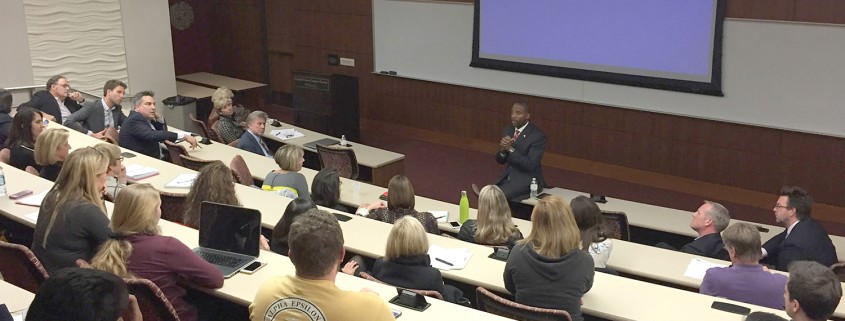Meeting held to discuss greek recruitment
As part of an ongoing discussion over the deferment of greek recruitment, Vice President for Student Affairs Ainsley Carry met with the advisers of several greek organizations Monday evening in the Ronald Tutor Campus Center.
“I don’t want us to have an issue on this campus that we’re afraid to talk about,” Carry said. “This is an issue that we’ve been hesitant to talk about: the quality of student safety, health and well-being if you’re in a greek letter organization.”
On Sept. 30, the Academic Senate unanimously passed a proposal to defer greek recruitment for freshmen to the spring semester and require transfer students to wait until they have obtained a USC GPA before participating in the process. Leaders of both the Interfraternity Council and the Panhellenic Council have expressed their disapproval both with the resolution and the lack of student involvement in the process so far.
Carry stressed the fact that the resolution was not a University policy, but rather a question raised by the faculty that needed to be considered. At the end of the meeting, he said that, after consulting with all the relevant stakeholders, he would present an alternative to deferred recruitment to the Academic Senate based on the input he received. Carry said he would meet with advisers, parents and students in the spring to discuss specific improvements for the greek new member experience.
In his opening remarks, Carry said that Student Affairs was concerned with a number of trends among first-year students. He said that issues of mental health, overconsumption of alcohol and sexual assault disproportionately affect first-year students, citing data from Department of Public Safety reports of alcohol-related transports and data from the campus climate survey on sexual assault and misconduct released earlier this semester.
“How do we make the first year experience at USC better?” Carry said. “How do we make it a softer place to land when students arrive here?”
Carry said that the Student Affairs Committee of the Board of Trustees recommended that he look at the first-year experience for greek students as part of his examination of the first-year experience for all students. This was followed by the resolution passed by the Academic Senate.
“That resolution said the University should think about deferring recruitment because of what faculty members see when they look at their students in the classroom and they see the fraternity man in the class who is late, who is exhausted, who is not turning work in on time,” Carry said.
Carry said he had met with representatives from both IFC and PHC who expressed their concern over potential new members interacting with active members, or “dirty rushing,” in the fall semester and explained the protective measures in place for new members. Both councils were also concerned with the financial impact on smaller houses if new members are not brought in during the fall.
Jinny Dalbeck, advisory board chairman for the Kappa Alpha Theta sorority, spoke as a representative for sorority advisers. Dalbeck said that all greek organizations were committed to providing the best USC experience.
“We feel strongly that our fraternal organizations do provide, as you mentioned, that support system to these young people that otherwise wouldn’t be available to them for an entire semester,” Dalbeck said.
Dalbeck noted a resolution passed by the Academic Senate in the late 1990s that resulted in greek recruitment being moved from the summer to the first week of classes. Dalbeck said that was the result of close work between the greek community and the administration, which she hoped to see in this process as well.
Dalbeck mentioned the beneficial aspects of sorority involvement including counseling services, GPA requirements for both active members and sorority leaders, mentorship between older members and new members and alcohol safety protocols.
“We provide a lot of support to give them that soft landing,” Dalbeck said.
Russ Chesley, chapter adviser for the Kappa Alpha order, spoke as a representative of the fraternity advisers.
Chesley said that fraternities nationwide have moved to shorter new member recruitment processes and that if a fraternity man’s academic performance was being adversely impacted, there was likely something wrong with that fraternity’s new member education.
Chesley said he would like to see data on the GPA of greek new members compared to new freshmen as a whole and that fraternities were committed to examining and improving the recruitment process.
“We think there is room for improvement certainly, but we also believe that what we provide is really unique and really special for our first year students,” Chesley said.
Chesley said that focusing solely on the deferment of greek recruitment does not address issues of stress and alcohol abuse that would still persist during the fall, and that greek organizations can help students during the transition to college.
“When we have new members, what we have is a great opportunity to monitor those new members and keep them safe, they’re under our wing then,” Chesley said.

